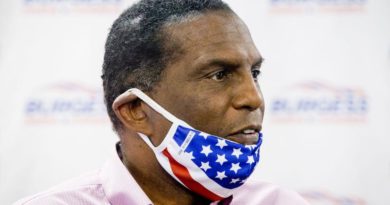Why You Should Care About QAnon
A few days ago I was playing dentist with my 4-year-old niece Avie and her doll Lola — a rigid rubbery thing with a locked jaw from which protruded two small front teeth. As Lola’s mother, Avie insisted that I give Lola a thorough exam. Dutifully, I complied, pretending to examine the doll’s mouth.
“Is she brushing regularly?” I asked with feigned professional concern.
Avie brought her face close, and her milk chocolate-colored eyes gazed kindly into mine. “Actually,” she explained in a gentle whisper, “She’s just a doll.”
Then, reverting to our game of pretend, she instructed me to switch from dentist to doctor and diagnose Lola’s stomach ache.
That careening between make-believe and the real world has been on my mind as I try to get inside the heads of the 20% of Americans who think that COVID-19 outbreak was probably planned by a small group of powerful people, and the additional 5% who believe it definitely was. To be clear: that’s 1 in 4 Americans, who, in embracing that narrative, effectively reject science. That’s not just an intellectual failing; it is a form of ideological zealotry that has cost tens of thousands of lives. And it’s just one of the more benign manifestations of a new meld of paranoia and religious zeal that could fuel the reelection of Donald Trump.
That’s not just an intellectual failing; it is a form of ideological zealotry that has cost tens of thousands of lives.
There are many variations on the theory that COVID-19 was a master stroke. The virus was co-created by Anthony Fauci and Barak Obama (as agents of the Deep State), or the pandemic is a product of a covert intelligence operation designed to distract the world from bringing a Satanic cabal to justice. Or Bill Gates is behind the current crisis, using the pandemic as a cover for pushing a vaccine containing a tracking device that will keep tabs on everyone on the planet (44% of Republicans subscribed to that premise in a recent poll and its proponents maintain was foretold in the Book of Revelations). But if not Bill Gates, then the Chinese government is responsible, having created COVID-19 as a population control bioweapon. No, wait — it was actually “purposely created and released so that central bankers, investment bankers, corporate heads, and government puppets could use it as cover for an imminent economic collapse.” Either that or the pandemic has been overblown in order to create a financial crisis to ensure the defeat of Donald Trump.
And these conspiracy theories are just the tip of this iceberg of self-delusion. The QAnon movement — a loose network of extreme right-wingers with an apocalyptic bent — looks deeper than COVID-19, into what gave rise to Donald Trump’s election. Their conclusion? With or without divine intervention (but probably with it), Trump was elected to put an end to the worldwide cabal of Satan-worshiping pedophiles that rule the government, the media and Hollywood.
Some QAnon beliefs (such as that Oprah Winfrey and Tom Hanks have been arrested for running child sex rings) are grotesquely sensational. Others are more pointedly and strategically partisan (like that Adam Schiff’s sister is married to the son of villainous puppet master, George Soros, despite the fact that Adam Schiff doesn’t have a sister).
Many suggest that Trump either is himself the anonymous “Q” or that he endorses QAnon’s theories. Indeed, as Peter Beinert notes, “Trump himself has suggested that Antonin Scalia might have been murdered, climate change is a Chinese hoax, Ted Cruz’s father was involved in John F. Kennedy’s assassination, the Clintons may bear responsibility for the murder of Jeffrey Epstein, and wind turbines cause cancer.”
And after all, Trump wore a tie to a coronavirus briefing that was yellow — the color of the maritime flag representing the letter Q (for “quarantine”) and indicating that there are no infected people aboard ship. What better way to signal that the pandemic isn’t real?

These malevolent fairy tales are not shared just by a handful of kooks on the fringes of society. The winner of Georgia’s Congressional GOP primary runoff, Marjorie Taylor Green, was apparently more helped than hindered by her anti-Semitic, Islamophobic comments and endorsement of “Q.” And she is just one of 14 Republican candidates on the ballot in November or competing in primary runoffs, who tweet QAnon’s “secret” acronyms and endorse its theories.
Not only are these beliefs vile, but they are precisely the kind of distraction that Trump and his cronies welcome. Notably absent from any of the QAnon theories is any fact-based analysis of capitalism — of who makes the money and the rules, or of how. Were they curious about the real ways that the deck is stacked against them, this group of conspiracy theorists would discover surprising agreement with those at the other end of the political spectrum.
But what QAnon followers and COVID-deniers believe is ultimately less important than why.
“[QAnon] harnesses paranoia to fervent hope and a deep sense of belonging …” writes Adrienne LaFrance in a thoughtful Atlantic article. “[It] offers a polemic to empower those who feel adrift.”
Physically and politically Balkanized, Americans’ sense of community has been steadily eroding. And even before the pandemic, Americans were feeling increasingly powerless, for good reason. Income inequality and the disparities in political power that reflect it, have left policy-making largely in the hands of large business interests, with little or no meaningful influence exercised by average citizens or mass-based interest groups.
“[QAnon] harnesses paranoia to fervent hope and a deep sense of belonging … [It] offers a polemic to empower those who feel adrift.”
Adrienne LaFrance
One antidote to feeling personally impotent is to attribute absolute power to sinister forces. One cure for loneliness and alienation is to feel that you are a part of today-victimized, tomorrow-triumphant group that possesses secret knowledge.
For some followers, QAnon may be little more than an ever-evolving fantasy game. But even games of make-believe carry risks. The cult is getting large and dangerous enough that in an internal memo last year, the FBI classified QAnon as a domestic terrorism threat.
While children are generally able to distinguish between pretense and reality, those unable to regulate their negative emotions like fear and anger (which sadly, are chronic emotional states for Americans across the political spectrum) seem to be more easily confused about what is real versus what is fantasy. When we play with children, we jointly enter into a conspiracy to temporarily suspend disbelief, to pretend while at the same time acknowledging that we’re doing so. But what the COVID-19 hoax proponents and QAnon followers do is the opposite; they suspend disbelief in order to embrace a conspiracy.
Unlike 4-year-old Avie, they struggle to differentiate between what is fun and what is fact, what is play and what is truth. And unlike Avie’s doll Lola, their delusions have real teeth that bite.
*** This article has been archived for your research. The original version from WBUR can be found here ***

